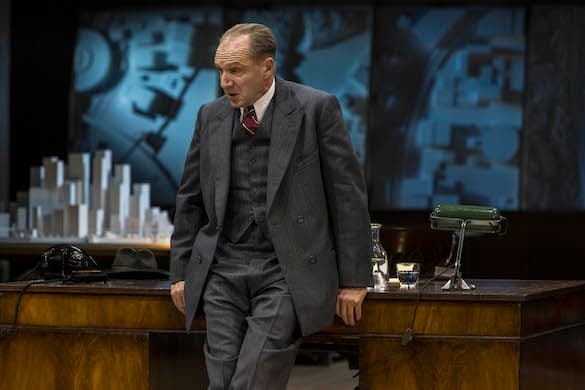David Hare on Robert Moses: ‘Straight Line Crazy’ Is One Hot Ticket
By focusing on the urban planner who reshaped New York in the 20th century, the playwright had fodder for a smart, juicy, and topical look at issues that have only gained relevance in recent years. Plus, the staging is superb.

The pairing of Robert Moses and David Hare would seem like a match made in heaven. The latter, a playwright and screenwriter who was knighted in 1998, has addressed historical figures ranging from Oscar Wilde and Virginia Woolf to George W. Bush and Rupert Murdoch in his work, and in Moses — the urban planner who reshaped New York in the 20th century through a series of hugely ambitious projects, igniting epic power struggles in the process — he had fodder for a smart, juicy, and topical look at issues that have only gained relevance in recent years.
“Straight Line Crazy,” which arrives at New York after earning acclaim in London, is just that, not to mention gorgeously staged. Co-directors Nicholas Hytner — who suggested the subject to Sir David — and Jamie Armitage enlisted the duly celebrated Bob Crowley to design the set and costumes; at the Griffin Theater, part of the Hudson Yards arts complex The Shed, the production unfolds on a vast thrust stage, where audience members view the action from one of three angles.
Nearly bare at first, the space fills gradually to represent different settings in the mid-1920s, when Moses began his rise in positions such as New York’s secretary of state and the first chairman of the New York State Council of Parks, and — in Act Two — 1955. By that point, Moses had juggled other titles while overseeing a dizzying array of public works projects, providing New Yorkers with more than 600 miles of expressway and many more recreational facilities while also uprooting communities in which Black and Latino residents happened to be prominent.
As furnished by Mr. Crowley, Moses’s offices are at once austere and breathtakingly aspirational, reflecting the rigor, ambition, imagination, pigheadedness, and megalomania that by various accounts — notable among them Robert Caro’s Pulitzer Prize-winning biography, “The Power Broker” — defined Moses as a visionary and a personality. There are the tables immaculately lined with tiny buildings, and the rows of charts placed just so, never crowding each other out.
There’s also, crucially, the witty, passionate, and beautifully modulated performance of theater and film star Ralph Fiennes in the role of Moses. A leading man who has steadily expanded his palette over the past three decades by placing variety and substance over vanity, Mr. Fiennes channels Moses’s restlessness so thoroughly that it becomes a physical trait, palpable in his posture — almost hulking at the character’s most formidable, or frustrated — and the way he paces the stage.
While it’s surely Mr. Fiennes’s presence, as much as the prospect of learning more about a New York icon, that has made “Straight Line” one of the season’s hottest tickets, the entire company is central, and superb, in tracing Moses’s evolution from an idealistic reformer to an establishment figure whose efforts are viewed by many as oppressive. In an early scene, Henry Vanderbilt, played by a crisp Guy Paul, laments Moses’s plan to open up Long Island to the hoi polloi.
“Why do they have to come here at all?” Mr. Paul’s Vanderbilt sniffs, to which Moses responds, “Why did you come here?” Thirty years later, a young assistant to Moses — one of several fictional characters in the play — accuses him of acting tyrannically toward the less privileged. “The planner sits in his office and imposes his will,” she muses. “Nowadays people don’t want to be told how to live.”
It’s this arc — from being an activist to opposing activists, as the assistant puts it later, essentially — that clearly fascinates Sir David, and the playwright, without vilifying Moses, underlines the arguments that have made him even more politically unfashionable over time. In a climactic showdown, a higher-ranking employee, also an invented character, comes close to speechifying: Referring to Moses’s infamous aversion to public transit, she proposes that her boss built Jones Beach “only for the kind of people you like. … Clean people, Bob. Well-off people, Bob. White people.”
Sir David is too wise and witty a writer to get mired in pedantry, though, and under the razor-sharp guidance of Messrs. Hytner and Armitage, the actors ensure that the characters transcend the beliefs and causes attached to them. These include other historical figures, like the crusading journalist Jane Jacobs and fellow preservationist Shirley Hayes, represented here in spirited, endearing performances by, respectively, Helen Schlesinger and Alana Maria.
A four-term New York governor, Al Smith, whom Moses deeply admired, also turns up, in the crackling presence of stage and screen veteran Danny Webb. “He’s a new kind of man, Mr. Moses,” Smith muses, before sparring fiercely with him. “The man who believes that the way you’re written about is as important as the job you do.”
I suspect that Moses, who took a few shots at Mr. Caro, might object to at least some of what’s written in “Straight Line Crazy.” Yet that shouldn’t stop anyone who can land a ticket from doing so, quickly.

